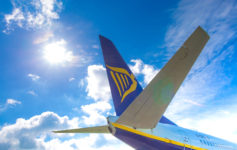
European and British leaders have responded to Sunday’s forced Ryanair diversion by calling for the ban of Belavia Belarusian Airlines, the flag carrier of Belarus. Such bans, while theoretically logical, often hurt the very people they intend to help.
Belavia Ban Will Have Unintended Consequences
For decades, the United States tried to promote democratic reform and regime change in Cuba through an embargo, including a flight ban. Families were separated, citizens remain impoverished, but the prevailing theory was that allowing air travel and greater commerce between the two nations would not trickle down to help people but only prop up the communist regime.
Yet a Castro remained in power until only recently and the island nation just 90-minutes off the coast of Florida still professes allegiance to communism. Even more sobering is the poverty that impacts so many citizens to this day.
Blaming the embargo for the economic woes of Cuba fails to get to the root of the problem, a corrupt government and unworkable system, but it has not helped stop communism or bolster the Cuban people.
A similar argument could be made in Iran, contrasting the pain of the Iranian people with the corruption of their theocratic rulers. Sanctions hurt governments, but they also hurt people, many people just trying to make an honest living and provide for their loved ones.
In Belarus, sanctions are already in place. They will persist and grow more severe. The United Kingdom has already revoked Belavia’s operating permit and the European Union has now followed. Belavia, which planned to serve 20 EU destinations this summer, will now serve zero. Lufthansa has already suspended service and the EU has encouraged other EU carriers to do the same.
But who will be impacted most in a nation that has strict exit controls? With flying west now more difficult than ever (versus flying east to Moscow, which was considered a domestic flight with no passport control until 2017), will there be a new iron curtain that ends up hurting the very people it intends to help?
The hope may be that more and more citizens, upset with the Europe’s last dictator, rise up and rebel on an even larger scale than after disputed presidential elections last summer.
But speaking as a traveler who has visited a host of “naughty” nations and exchanged in meaningful dialogues with the citizens (particularly in Cuba and Iran), I always believe engagement is the better policy. Ideas are spread through engagement and when citizens experience the culture and commerce (and sometimes the indulgence) of the west, it becomes a very effective motivator for reform (why else would Mainland China exercise such strict control of information?).
CONCLUSION
I’m always skeptical of flight bans, particularly as a tool of diplomacy, because I think they often hurt who they are intended to help. I think the people of Belarus will ultimately hold their leaders accountable. But I think we hinder that from happening by banning airlines like Belavia from the west or by western carriers halting service to Minsk.
What are your thoughts on the ban on Belavia and flight bans in general?
image: Belavia




I understand your point, but this is also about other dictators. Belarus must be made an example of so other dictators will think twice about this kind of behavior.
I suppose there is more than one way to look at these flight bans.
From a cynical realpolitik point of view, it is more important for the West to publicly show that it is “doing something” to stand up to the Bad Guys–the exact nature of the response matters less and its effectiveness even less so. I think the speed at which these bans were enacted (in a land where nothing moves fast with government) speaks volumes; heck it took the EU longer to enact sanctions following the sham election in August! In this case, flight bans can be quickly enacted, quietly dismantled if needed, and appear linked to the offending action–so they check all the required boxes.
From a “normal” viewpoint, I completely agree that flight bans and travel restrictions don’t work (neither sufficient nor necessary) to bring about actual change. We all know the regime insider will still be able to travel if they so choose, albeit with some inconvenience, while now the common people will be exposed to less Western influence and people. Will this sudden difficulty in travelling to Europe catalyze the revolution? Maybe but I doubt it and I don’t think anyone in policy circles truly believes it either.
The ideas mentioned are worth considering. With Cuba, a flight ban isn’t the cause of Cuban economic trouble. Castro was the cause. Cuban immigration to the US has been extremely easy except for Cuban restrictions. For many years, the policy was “wet foot, dry foot”.
What might be effective is to kidnap the Belarus president but then Putin might kidnap the the EU or Council president. That’s why Churchill and Hitler didn’t try to bomb the other person’s residence.
There is a significant difference between the US promoting democracy in Cuba and the state sponsored hijacking of a commercial airliner. It is a matter of opinion whether or not democracy would be better for Cuba whereas hijacking the Ryanair flight is clearly wrong. Not punishing the Belarus government would show them and other governments that it is okay to divert flights and kidnap passengers that the government doesn’t like. Should countries stop screening passengers, have an open cockpit door and eliminate air marshals?
On the one hand, years of sanctions didn’t bring change in Cuba and Iran.
On the other hand, years of meaningful dialogue with Matthew didn’t bring change either.
So hard to tell which approach is better.
My question here is what’s the end game?
Of course we’d love to see Protasevich released, but Lukashenko won’t do that, nor does he really have any incentive to. He doesn’t care about his people, and Russia is refusing to take a stand, thereby tacitly supporting what happened. I’m not sure there’s anything tangible that could reasonably happen here. I feel bad for the people of Belarus, but I imagine flights will quietly resume later this summer.
Seriously, long term sanctions won’t cause change. But on the short term they can help.
The most important thing is that Belarus will realize kidnapping the plane wasn’y worth it. They’ll never admit this of course.
On the best case scenario they’ll back off and release the reporter, so sanctions would be lifted. Don’t know if there’s a real chance.
But even if not, Belarus and other countries will probably avoid such moves in the future, which is something.
I also think it’s important that these are not arbitrary sanctions. Aviation has rules, and if they don’t play by the rules they don’t play. A clear message is always good.
remember the hot air balloon that was shot down by Belarus in 2011 – yes, the dic(k)tator is still in power!
What course of action would you suggest? This gross violation of law and anything resembling accepted norms requires a response that will make other countries pause before doing the same. Otherwise, state sponsored hijackings will become the rule instead of an outrageous exception.
Is there an Iran trip report?
Yes there is! One of my favorites.
https://liveandletsfly.com/a-spur-of-the-moment-trip-to-the-islamic-republic-of-iran/
“I think the speed at which these bans were enacted (in a land where nothing moves fast with government) speaks volumes; heck it took the EU longer to enact sanctions following the sham election in August!”
Good for the EU for taking quick and decisive action then. Hopefully they will do the same in the future.
“On the one hand, years of sanctions didn’t bring change in Cuba and Iran.
On the other hand, years of meaningful dialogue with Matthew didn’t bring change either.”
Ok, this was funny.
The USA didn’t promote democracy. They were promoting the interests of their favoured dictator. Promoting democracy my ass cheek
The actions taken by Belarus against the Ryanair flight and the passengers abducted cannot go unpunished. But this seems like a prudent precaution so it does not happen again. If someone really wants to go to Minsk, fly to Vilnius and cross the border by train or bus. The border has not been closed, but state sponsored air piracy is not acceptable.